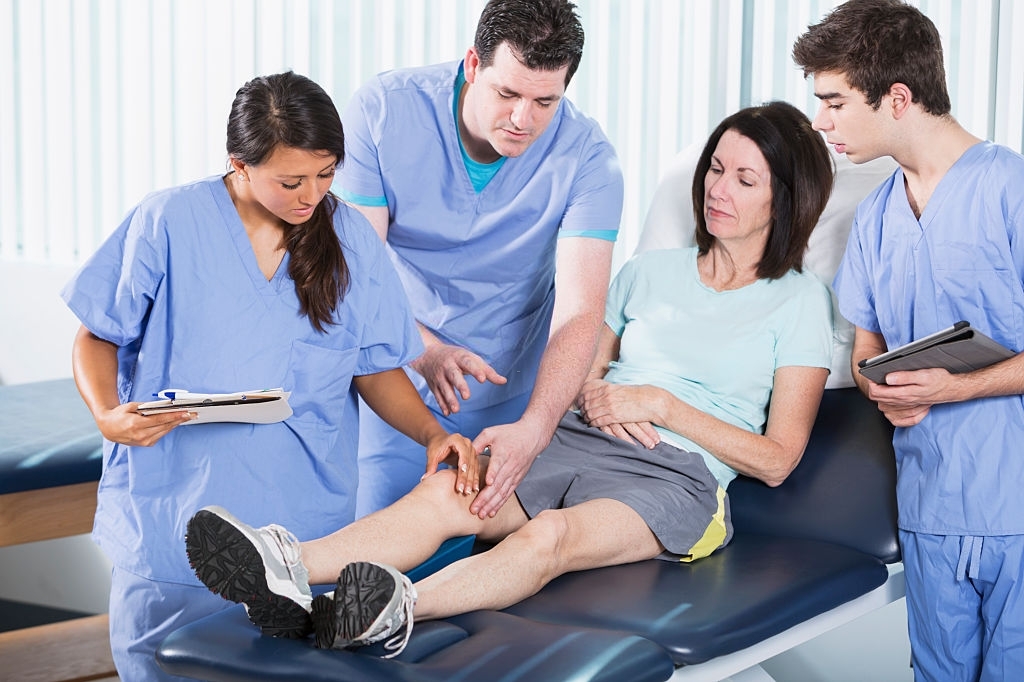Training & Conferences
Doctor’s Training
Our philosophy is embedded in the integration of a practice based on the evidence and the art of a realistic, honest and efficient clinical practice. With the aim of improving the quality of care, better collaboration between professionals and holding enriching exchanges, we offer continuing medical education (CME) activities intended for groups of physicians. The courses offered will allow physicians to better appreciate new approaches to assessment and treatment in musculoskeletal medicine and physiotherapy, to improve their clinical examinations and to optimize the prescription of para-clinical examinations and treatments.
These trainings will answer several questions
- How to make an effective differential diagnosis in musculoskeletal pathologies?
- Which treatments should be promoted and which should be discouraged?
- What paraclinical examinations should be prescribed?
- How to prevent chronicity in musculoskeletal medicine?
- Is physiotherapy relevant?
- How to differentiate between mechanical, inflammatory, neurological, neuropathic and those of central origin?

Training activities offered
Clinical diagnosis of pain of sacroiliac origin, simple, rapid and based on the evidence:
Duration: 1:30h
Theoretical and practical course
Theoretical and practical course
PPAS: Physiotherapeutic puncture with dry needles - An emerging practice in physiotherapy
Duration: 1:00h
Theoretical course and practical demonstration
Goal: To inform physicians about the PPAS, a new treatment technique reserved for physiotherapists and legally permitted in Quebec since 2011.
Discover the history of PPAS, understand the technique and its mechanisms of action, learn what conditions can be treated with dry needles and watch a demonstration of the technique.
Theoretical course and practical demonstration
Goal: To inform physicians about the PPAS, a new treatment technique reserved for physiotherapists and legally permitted in Quebec since 2011.
Discover the history of PPAS, understand the technique and its mechanisms of action, learn what conditions can be treated with dry needles and watch a demonstration of the technique.
Iontophoresis with dexamethasone: A versatile and non-invasive alternative to musculoskeletal pain
Duration: 1:00h
Theoretical course
Goal: To democratize an underused treatment technique for inflammatory musculoskeletal pain; administration of dexamethasone by iontophoresis is a non-invasive alternative to corticosteroid infiltration or when this is practically or technically more difficult to perform.
Know the technique of administration of dexamethasone by iontophosresis and discuss, using a case history, the conditions that may benefit from this treatment.
Theoretical course
Goal: To democratize an underused treatment technique for inflammatory musculoskeletal pain; administration of dexamethasone by iontophoresis is a non-invasive alternative to corticosteroid infiltration or when this is practically or technically more difficult to perform.
Know the technique of administration of dexamethasone by iontophosresis and discuss, using a case history, the conditions that may benefit from this treatment.
Musculoskeletal update: the shoulder
Duration: 1:00h
Theoretical course and practical demonstration
Purpose: Refreshment on the orthopedic non-traumatic shoulder examination: to focus on the key elements of the subjective examination, the objective examination, the analysis and the treatment plan.
Theoretical course and practical demonstration
Purpose: Refreshment on the orthopedic non-traumatic shoulder examination: to focus on the key elements of the subjective examination, the objective examination, the analysis and the treatment plan.
Musculoskeletal update: the knee
Duration: 1:00h
Theoretical course and practical demonstration
Purpose: Refreshment on the orthopedic non-traumatic knee examination: to focus on the key elements of the subjective examination, the objective examination, the analysis and the treatment plan.
Theoretical course and practical demonstration
Purpose: Refreshment on the orthopedic non-traumatic knee examination: to focus on the key elements of the subjective examination, the objective examination, the analysis and the treatment plan.
Demystify motor control and neuromuscular control
Duration: 1:00h
Theoretical course and practical demonstration
Goal: To understand the theoretical concepts of motor control or neuromuscular control and to appreciate, with the help of practical demonstrations, the importance and the implication of motor control deficits in musculoskeletal pathologies.
Physicians are regularly put in contact with the terms “motor control” and “neuromuscular control exercises” in physiotherapist assessment or follow-up notes. They daily diagnose motor control problems in their patients and prescribe neuromuscular control exercises. The assessment and treatment of motor control deficits is an emerging practice in musculoskeletal and the appreciation of the quality of movement is considered by many experts to be fundamental to the understanding and management of musculoskeletal disorders.
Theoretical course and practical demonstration
Goal: To understand the theoretical concepts of motor control or neuromuscular control and to appreciate, with the help of practical demonstrations, the importance and the implication of motor control deficits in musculoskeletal pathologies.
Physicians are regularly put in contact with the terms “motor control” and “neuromuscular control exercises” in physiotherapist assessment or follow-up notes. They daily diagnose motor control problems in their patients and prescribe neuromuscular control exercises. The assessment and treatment of motor control deficits is an emerging practice in musculoskeletal and the appreciation of the quality of movement is considered by many experts to be fundamental to the understanding and management of musculoskeletal disorders.
